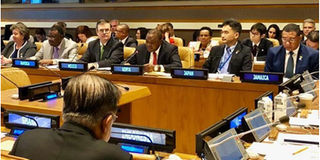Uhuru Kenyatta calls for citizen ownership of Universal Health Coverage

World leaders at the 74th session of United Nations General Assembly on September 23, 2019 in New York City. PHOTO | PSCU
What you need to know:
- President, in an address in New York during the 74th session of United Nations General Assembly, said political commitment is essential for the success of the programme.
- He said Kenyans' health-seeking behaviours, hospital visits and admissions have improved.
- Infotrak survey reveals that only three out of ten Kenyans are even aware of the UHC programme.
New York,
President Uhuru Kenyatta has called on politicians and stakeholders to mobilise communities and citizens to own the Universal Health Coverage (UHC)initiative.
The President, in an address in New York during the 74th session of United Nations General Assembly, said political commitment is essential for the success of the programme.
He was speaking on key lessons and best practices in Kenya's journey towards the achievement of UHC.
The commitment, he said, must be a shared vision of all political leaders and actors in a country especially in countries with more than one level of government like in Kenya.

President Uhuru Kenyatta gives an address during the 74th United Nations General Assembly on September 24, 2019 in New York City. PHOTO | PSCU
“This will only be impactful if translated from a shared vision to collaborative action resonating the principle of leave no one behind with every citizen and reinforcing the much needed social accountability for the success of service delivery and all interventions,” he said.
INTEGRATED APPROACH
Mr Kenyatta said all actions and interventions by health sector actors need to be harmonised and aligned where local, national and international is necessary.

President Kenyatta holds talks with UN Secretary General Antonio Guterres on September 24, 2019 at the ongoing 74th UN General Assembly in New York City. PHOTO | PSCU
“We have learnt that progress towards UHC will require an integrated government approach and health system-wide approach,” Mr Kenyatta said.
The President said Kenyans' health-seeking behaviours, hospital visits and admissions have improved.
“This has reaffirmed my government commitment to soldier on and make further investment in affordable health care and we are moving forward to meet the principle of leaving no one behind.
“My government is geared towards basic primary health care services and finding ways of integrating cost-effective technological advances in providing care even at the lowest level possible.
UHC SCORECARD
The President's address was made barely hours after research firm Infotrak released a UHC scorecard in Kisumu.
According to the report, only three out of ten Kenyans are even aware of the UHC programme despite the pilot project launch in Kisumu County in December last year amid much fanfare.
The survey, conducted between September 10 to 14th, revealed that the awareness is highest among those with post-secondary education at 42 percent and lowest for the illiterate at seven percent.
However, on the contrary, those who know about UHC are still unlikely to register for it, the survey noted.

World leaders at the 74th session of United Nations General Assembly on September 23, 2019 in New York City. PHOTO | PSCU
The survey showed that a majority of Kenyans have yet to understand how the programme works.
“People are not aware of how UHC works. A majority (59 percent) believe with UHC, one can access healthcare services in any healthcare facility in the country. Another 52 percent believe with UHC, one has to be a member of NHIF to access healthcare services,” Infotrak said.
The survey also revealed that only four out of ten Kenyans were satisfied with healthcare services received under UHC from the public facilities.
Nyeri and Kisumu counties led in satisfaction level each recording 76 percent, Isiolo 74 percent while Machakos 60 percent.
The first phase of the programme was only rolled out in the four counties targeting 3.2 million Kenyans with full rollout in all the 47 counties expected by 2022.




